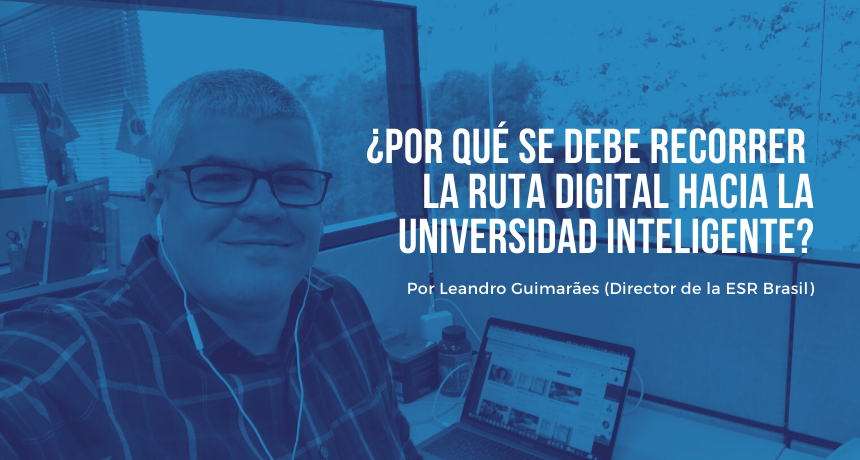Educational institutions are being forced to make a major change due to the new Coronavirus pandemic. Certainly, the transformation process was accelerated in a few years, due to the urgent need for teaching to have to break the geographical, technological and, the most difficult one, the customs barriers.
The year 2020 is proving to be a year that will certainly have some chapters in the history books. At the end of 2019, some news of a new virus in a region of China were not enough to transmit to the world the size of the danger and the changes that this microscopic being would force to happen. Until mid-February, the world continued to discuss the term “Digital Transformation” as something important to think about in the distant future. Using the conceptualization presented in “The Alchemy of Growth” (Mehrdad Baghai, Stephen Coley, and David White, The Alchemy of Growth, New York: Perseus Publishing, 1999), a study that provides a framework for companies to evaluate potential growth opportunities without neglecting the performance at present. The digital transformation at universities was still being thought of in the H2 or H3 scenarios, with H2 as the scenarios that extend the business model and the main existing resources of a company to new customers, markets or destinations and the H3 scenarios as the creation of new resources and new businesses to take advantage of or respond to interruption opportunities or combat interruptions. Although the study does not use the time variable as a major factor in decision making, in horizons 2 and 3, it ends up being seen as medium and long term, due to the process of analyzing new markets. At a time when the world was forced to remain in isolation, what was seen, in most educational institutions, was a great methodological conflict and lack of appropriate tools for students to continue their learning process, given that there was not an expectation of a very short-term return.
This is the current scenario, and what can we learn from it?
Universities have a great opportunity to exponentially expand their campuses, using the epidemiological need, which is forcing everyone to change their habits and behaviors, as a driving force in the digital transformation. It is important to point out that there are infrastructure problems, which prevent this transformation from being quick and painless, and that it must be worked together with governments, in the form of public policies, helping students who do not have the minimum infrastructure to follow classes remotely, to do so. In parallel, universities need to structure themselves so that the educational process uses innovative tools and methodologies so that students have the culture of lifelong learning imprinted in their DNA’s. Making this change in technological areas is certainly easier than in areas where both students and teachers do not have a natural technological sympathy, however, it is important that the faculty is trained in new learning technologies, so that they are prepared to motivate new generations in the search for knowledge.
We are reaching a time when the role of universities is being put to the test, given that 85% of professions in 2030 do not yet exist, according to the study “Designing 2030: a divided vision of the future”, commissioned by Dell Technologies at IFTF (Institute For The Future). In this study, the impacts of the work of machines integrated with humans until 2030 were analyzed. The survey, which involved the participation of 3,800 business leaders from medium and large corporations in 17 countries, including countries in Latin America, estimates that 85% of works that will exist in 2030 will be new.
How will universities prepare to train professionals in professions that do not even exist?
According to the article “The 10 skills you need to thrive in the Fourth Industrial Revolution”, what will differentiate professionals in the future will be soft skills, such as complex problem solving, critical thinking, creativity, emotional intelligence, among others. This shows that when we are dealing with digital transformation, we do not mean only in the systematization of processes, we mean bringing intelligence so that the processes are executed more efficiently. Some universities, such as Brown University (https://www.brown.edu/) in the USA, are changing the way they develop their students, through open curricula, where students can choose which courses they will participate in to build their curriculum, with this, they will be able to have a more general view, participating in several courses or going deeper into a certain theme, all being accompanied by tutors and advisors from the university itself. Including artificial intelligence algorithms so that it is possible, in a preemptive way, to identify which courses a particular student would be interested in according to his colleagues, it would be a great digital transformation, as it would bring efficiency to the students' training process, reducing the dropout in the courses.
We are privileged to be witnessing this moment where this great transformation of behavior is happening in society and, above all, we are acting as transforming agents so that universities are increasingly preparing themselves to train people who will transform the world.
Leandro Guimarães is the Deputy Director of the Superior School of Networks, RNP, Brazil.







